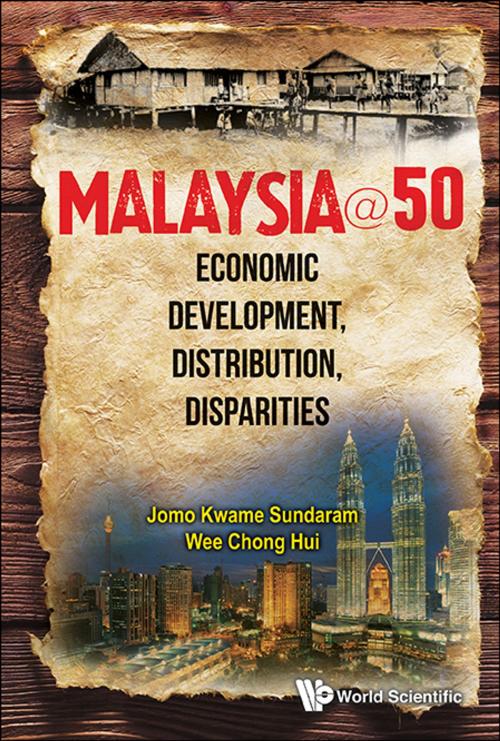Malaysia@50
Economic Development, Distribution, Disparities
Business & Finance, Economics, Public Finance, Economic Development| Author: | Jomo Kwame Sundaram, Chong Hui Wee | ISBN: | 9789814571562 |
| Publisher: | World Scientific Publishing Company | Publication: | September 16, 2013 |
| Imprint: | WSPC | Language: | English |
| Author: | Jomo Kwame Sundaram, Chong Hui Wee |
| ISBN: | 9789814571562 |
| Publisher: | World Scientific Publishing Company |
| Publication: | September 16, 2013 |
| Imprint: | WSPC |
| Language: | English |
Malaysia has grown and changed a great deal since it was formed on 16 September 1963. It was then seen as an unlikely nation hastily put together as a federation of British controlled territories in the region. Brunei's refusal to join at the eleventh hour and Singapore's secession before its second birthday only seemed to confirm such doubts.
Yet, it has not only survived, but even thrived, often cited as a developing country worthy of emulation. Ruled by the same ruling coalition since the mid-1950s, it has been tempting to emphasize continuities, and there certainly have been many.
Looking back at its last half century, this volume first considers changes in development policy in response to national as well as international developments. The remaining three parts consider how public policy has been influenced by and has, in turn, influenced economic distribution, public finance and economic federalism.
Besides the familiar focus on ethnic disparities, regional and other distribution issues are considered. The discussion of government taxation as well as spending also focuses on distribution implications. Although constitutionally a federation, Malaysia has been more centralized than most federal states.
The way forward requires greater sensitivity to the complex political economy of Malaysia's unlikely, but nonetheless resilient federation and ruling coalition.
This book is published and distributed worldwide by World Scientific Publishing Co Pte Ltd except Malaysia.
Contents:
-
Development Stages:
- The Alliance Era (1957–1969)
- The First Decade of the New Economic Policy (1970–1980)
- Mahathir's Three Regimes
- Mahathir Regime 1: New Roles for the State (1981–1985)
- Mahathir Regime 2: Inducing Private Investments (1986–1997)
- Mahathir Regime 3: Crisis Management (1997–2003)
- After 1997
- After Mahathir
- Policy Lessons
-
Distribution:
- Income Distribution
- Population and Labour
- Employment Status
- Education and Employment
- Wealth Ownership Disparities
- Gender Disparities
- Regional Disparities
-
Public Finance:
- Taxation
- Direct Taxes
- Indirect Taxes
- Government Expenditure
- Privatization
-
Federalism:
- Formation of Malaysia
- Federal and State Government Jurisdictions
- Federal-State Financial Relations
- Public Accounts
- External Trade
-
Lessons?:
- Development Stages
- Distributional Struggles
- Public Finances
- Malaysian Federalism
- Concluding Remarks
Readership: Academics, researchers, professionals, policy makers interested in economic development of Malaysia.
Key Features:
- First book to focus on how public policy has evolved in response to economic development and distributional challenges in Malaysia
- Special focus on the changing role of public finances and federal-state relations in the country
Malaysia has grown and changed a great deal since it was formed on 16 September 1963. It was then seen as an unlikely nation hastily put together as a federation of British controlled territories in the region. Brunei's refusal to join at the eleventh hour and Singapore's secession before its second birthday only seemed to confirm such doubts.
Yet, it has not only survived, but even thrived, often cited as a developing country worthy of emulation. Ruled by the same ruling coalition since the mid-1950s, it has been tempting to emphasize continuities, and there certainly have been many.
Looking back at its last half century, this volume first considers changes in development policy in response to national as well as international developments. The remaining three parts consider how public policy has been influenced by and has, in turn, influenced economic distribution, public finance and economic federalism.
Besides the familiar focus on ethnic disparities, regional and other distribution issues are considered. The discussion of government taxation as well as spending also focuses on distribution implications. Although constitutionally a federation, Malaysia has been more centralized than most federal states.
The way forward requires greater sensitivity to the complex political economy of Malaysia's unlikely, but nonetheless resilient federation and ruling coalition.
This book is published and distributed worldwide by World Scientific Publishing Co Pte Ltd except Malaysia.
Contents:
-
Development Stages:
- The Alliance Era (1957–1969)
- The First Decade of the New Economic Policy (1970–1980)
- Mahathir's Three Regimes
- Mahathir Regime 1: New Roles for the State (1981–1985)
- Mahathir Regime 2: Inducing Private Investments (1986–1997)
- Mahathir Regime 3: Crisis Management (1997–2003)
- After 1997
- After Mahathir
- Policy Lessons
-
Distribution:
- Income Distribution
- Population and Labour
- Employment Status
- Education and Employment
- Wealth Ownership Disparities
- Gender Disparities
- Regional Disparities
-
Public Finance:
- Taxation
- Direct Taxes
- Indirect Taxes
- Government Expenditure
- Privatization
-
Federalism:
- Formation of Malaysia
- Federal and State Government Jurisdictions
- Federal-State Financial Relations
- Public Accounts
- External Trade
-
Lessons?:
- Development Stages
- Distributional Struggles
- Public Finances
- Malaysian Federalism
- Concluding Remarks
Readership: Academics, researchers, professionals, policy makers interested in economic development of Malaysia.
Key Features:
- First book to focus on how public policy has evolved in response to economic development and distributional challenges in Malaysia
- Special focus on the changing role of public finances and federal-state relations in the country















